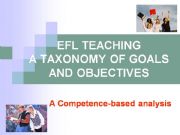
EFL Teaching a taxonomy of goals and objectives
SIX BASIC APPROACHES TO INTEGRATION
Action-based and action-driven teaching
Systemic teaching
Methodologies-based teaching
Concept and issue-based teachingepisteme)
Metoconcept-based teaching
Anthropological teaching
MODERN REQUIREMENTS TO
LESSON AIMES, GOALS AND OUTCOMES
Communicative s...
Level: advanced
Age: 14-17
Downloads: 25
|
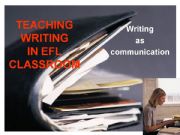
TEACHING �WRITING �IN EFL �CLASSROOM Writing as communication
Types of writing
Writing can be expressive, poetic, informative and persuasive.
Depending on the type of writing, the writer concentrates either on the subject matter of the written piece, or on the reader, or on one�s own feelings and thoughts.
The triangle of the �subject matter�, �writer� ...
Level: advanced
Age: 17-100
Downloads: 48
|
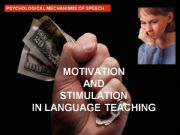
Motivation and stimulation in language teaching
From motivation and stimulation parameters
of speech generation and reception to EFL teaching principles
Motivate any utterance (passive or active)
In case of no real-life motivation, suggest role-playing strategies
State the aim clearly in communicative terms.
Not necessary to explain the mo...
Level: advanced
Age: 14-17
Downloads: 50
|

The use of informational technologies at early stages of studying the Japanese language
The use of informational technologies at early stages of studying the Japanese language
Level: advanced
Age: 14-17
Downloads: 1
|

What audiovisuals and technical devices should be used in EFL teaching?�
audiovisuals and technical devices in EFL teaching
Level: advanced
Age: 14-17
Downloads: 19
|

SEMANTIZATION �SEMANTIZE� BEFORE YOU LEAP
SEMANTIZATION
is a step-to-step process
presupposes a whole range of intellectual operations (mental, intellectual, thinking), to be done to establish lexical and grammatical links in the sentence:
breaking the sentence pattern into logical elements
defining grammatical and lexical meanings
re...
Level: advanced
Age: 14-17
Downloads: 13
|
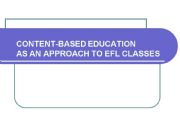
EFL TEACHING SLIDES Lecture 37 - CONTENT-BASED EFL
Our assumption is that a content-based class,
on one hand, enhances EFL competencies by making the language units relevant in the eyes of the learner, and,
on the other hand, ensures a broader scope of vision, better retention and more profound understanding of other disciplines, whether at seco...
Level: advanced
Age: 17-100
Downloads: 20
|

LESSON STAGES and LESSON LINKS
Any textbook offers training and speech tasks and exercises
Training exercises alone often fail to prepare the learner for communicative tasks.
Fill in the required tense forms
Translate into Russian
Give examples using the words and phrases
Such tasks never prepare learner for communication: ...
Level: advanced
Age: 14-17
Downloads: 11
|
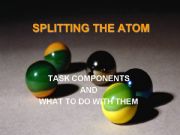
TASK COMPONENTS AND WHAT TO DO WITH THEM
TASK COMPONENTS
AND
WHAT TO DO WITH THEM
Level: intermediate
Age: 14-17
Downloads: 1
|
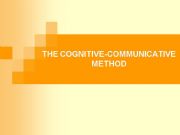
THE COGNITIVE-COMMUNICATIVE METHOD
A complex functional skill as a hierarchy of components
The teacher can draw a workable chart of functional skill components to keep track of them and to set a complex skill into motion as early as possible.
Such a chart will indicate where different functional skills overlap.
It is evident th...
Level: advanced
Age: 14-17
Downloads: 22
|